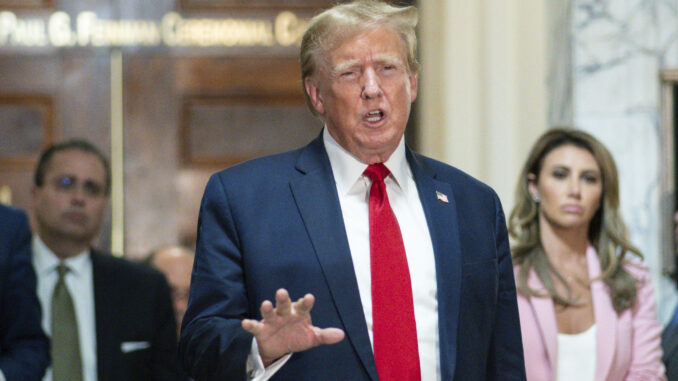
NEW YORK — After more than 10 weeks, 40 witnesses and bursts of courtroom fireworks, testimony wrapped up last Wednesday in former President Donald Trump’s civil business fraud trial. But a verdict is at least a month away.
Closing arguments are set for Jan. 11, and Judge Arthur Engoron has said he hopes to decide the case by the end of that month. The case threatens to disrupt the 2024 Republican front-runner’s real estate empire and even stop him from doing business in his native state.
The verdict is up to the judge because New York Attorney General Letitia James brought the lawsuit under a state law that doesn’t allow for a jury.
“In a strange way, I’m gonna miss this trial,” Engoron mused aloud Wednesday before the last hours of testimony, which were about accounting standards.
James’ lawsuit accuses Trump, his company and key executives — including sons Donald Trump Jr. and Eric Trump — of deceiving banks and insurers by giving them financial statements that padded the ex-president’s wealth by billions of dollars.
The suit claims the documents overvalued such prominent and personally significant holdings as his Trump Tower penthouse in New York and his Mar-a-Lago club and home in Florida, as well as golf courses, hotels, a Wall Street office building and more. State lawyers contend that Trump got lower interest rates and other benefits because of his stated riches.
The defendants deny any wrongdoing, and Trump has vehemently made that clear on the witness stand, in the courthouse hallway, and on his Truth Social platform.
“A total hit job,” he railed Wednesday in an all-caps post. Both James and the judge are Democrats, and Trump casts the case as a partisan attack.
Trump not only testified but voluntarily sat in on several other days of the trial, though not Wednesday. James watched from the courtroom audience.
Trump took a significant legal hit even before the trial, when Engoron ruled that he engaged in fraud. The judge ordered that a receiver take control of some of the ex-president’s properties, but an appeals court has frozen that order for now.
The trial concerns remaining claims of conspiracy, insurance fraud and falsifying business records. James is seeking penalties of more than $300 million and wants Trump to be banned from doing business in New York.
The attorney general said in a statement that after the pretrial ruling found that Trump “engaged in years of significant fraud and unjustly enriched himself and his family, this trial revealed the full extent of that fraud — and the defendants’ inability to disprove it.”
Trump lawyer Christopher Kise urged Engoron to rule immediately for the defense, contending evidence showed “there was no fraud, there were no victims and there has simply been no harm.” Trump will appeal if he loses, Kise said.
Testimony and documents showed the Trump Tower penthouse was claimed as nearly three times its actual size — just a mistake, Trump said. Mar-a-Lago was valued as high as $612 million, based on its potential sale as a private home, though Trump signed a 2002 agreement not “to develop the property for any usage other than club usage.” Trump says he believes it could revert to only a home.
The trial gave the court and onlookers a view into Trump’s properties — sometimes quite literally, as when a real estate broker played a drone video of Mar-a-Lago.
Much testimony entailed deep dives into loan underwriting, property appraisal methods and financial practices. For every magazine-like photo of a Trump property, there were pages of accounting rules or lines of charts and spreadsheets.
The proceedings featured testimony from three of Trump’s adult children: Donald Jr., Eric and their sister Ivanka, who was their fellow executive vice president at the Trump Organization before she left the company for the White House. Former Trump fixer-turned-foe Michael Cohen took the stand for the attorney general’s office.
The former president himself was a voluble and sharp-tongued witness, airing his grievances about the case as “a political witch hunt.”
He insisted he was worth billions more, not less, than his financial statements said. Trump insisted that any misstatements were immaterial mistakes and that disclaimers effectively told recipients not to count on the numbers. The disclaimers said, among other things, that the statements weren’t audited.
His discursive answers prompted the judge to bristle that “this is not a political rally.” Complaining that Trump was giving speeches instead of answering questions, Engoron urged defense lawyers to “control” the former president.
Some of Trump’s out-of-court comments led to a gag order that barred all trial participants from commenting publicly on the judge’s staff. The order, which Trump has decried and his attorneys are appealing, came after he maligned the judge’s principal law clerk.
Engoron has fined Trump a total of $15,000 after finding that he violated the order.
Yet the testimony phase ended on a cordial note Wednesday, with Kise thanking the court for investing time in the case and the judge expressing appreciation for all the work lawyers had done. Kise and some other defense attorneys shook James’ hand as they headed out of court.
Hours later, Engoron was among people who had to evacuate the courthouse after a man set some papers afire and doused them with a fire extinguisher. The man was arrested, court spokesperson Al Baker said. No one was injured, and Engoron and others returned to the courthouse after the all-clear.



